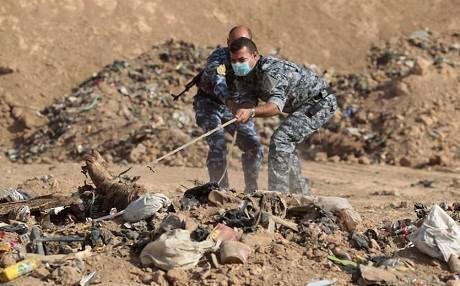
ISIS left at least 200 mass graves in Iraq
ISIS militants left behind more than 200 mass graves containing the remains of thousands of people, according to a United Nations report released Tuesday, documenting the legacy of the jihadist group’s atrocities and the needs of survivors.
Some 202 mass grave sites were documented by the United Nations Assistance Mission for Iraq (UNAMI) and the UN Human Rights Office in Nineveh, Kirkuk, Saladin and Anbar, but there are feared to be many more.
Jan Kubis, the UN secretary-general’s representative to Iraq, said identifying the bodies and determining what happened will help bereaved families cope with their loss.
“The mass grave sites documented in our report are a testament to harrowing human loss, profound suffering and shocking cruelty,” said Kubis. “Determining the circumstances surrounding the significant loss of life will be an important step in the mourning process for families and their journey to secure their rights to truth and justice.”
The graves could contain vital forensic evidence to help identify victims and piece together what happened.
“Evidence gathered from these sites will be central to ensuring credible investigations, prosecutions and convictions in accordance with international due process standards,” the report states.
“Meaningful truth and justice requires the appropriate preservation, excavation and exhumation of mass grave sites and the identification of the remains of the many victims and their return to the families,” it adds.
The report calls for the establishment of a public, centralized registry of missing persons and a federal Office of Missing Persons to reduce the challenges families currently face establishing the fate of their loved ones.
“ISIL (ISIS)’s horrific crimes in Iraq have left the headlines but the trauma of the victims’ families endures, with thousands of women, men and children still unaccounted for,” said UN High Commissioner for Human Rights Michelle Bachelet.
“These graves contain the remains of those mercilessly killed for not conforming to ISIL’s twisted ideology and rule, including ethnic and religious minorities. Their families have the right to know what happened to their loved ones. Truth, justice and reparations are critical to ensuring a full reckoning for the atrocities committed by ISIL.”
Hailing the work of Iraq’s Mass Graves Directorate, the report urges the government to protect and excavate these sites, and calls for a victim-centered approach and a transitional justice process.
It also calls on the international community to offer resources and technical expertise to support the exhumation process, identification, and the return of bodies to their families.
ISIS militants swept across western Iraq and the Tigris River Valley in the summer of 2014, capturing swathes of territory. The group established its so-called ‘caliphate’ encompassing areas of both Iraq and Syria.
The Yezidis of northern Iraq, considered devil worshippers by ISIS, were targeted in a genocidal campaign. Thousands of women and children were kidnapped to be sold into sexual slavery. Several mass graves containing those not abducted have already been uncovered.
Former Prime Minister Haider al-Abadi declared the defeat of ISIS in December 2017, months after the group’s last major urban stronghold Mosul was liberated by Iraqi forces with US-led coalition air support.
The group’s remnants continue to operate primarily along the Iraq-Syria border and in the mountainous areas of Kirkuk, Diyala, and Saladin.
Source: rudaw





